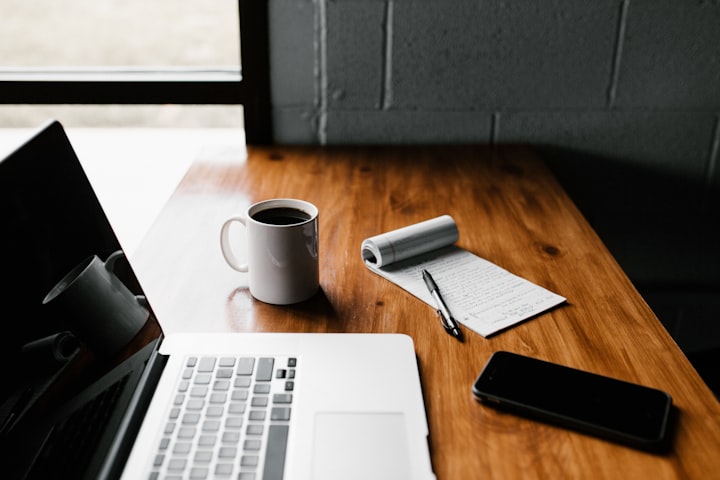Publishing the First Book Yourself Shouldn't Be About the Money
How I am using my first book to learn all I can about self-publishing.

A lot of people will jump into self-publishing with the idea of making it as an author and replacing a full-time income. Who wouldn't want to make enough to live on while sitting at home writing novel after novel?
Unfortunately, it doesn't always work out according to plan.
In fact, I know a lot of potentially good authors who gave up on self-publishing because the money just wasn't what they expected. And most couldn't afford to go the traditional route as many agents charge thousands of dollars to get a book published. The end result was those authors never truly getting the chance to fulfill their dreams. In fact, I know one personally who went to work at Walmart and never wrote again.
For me, it's all about the learning process. I am determined to become an expert in self-publishing, which means learning everything I can about the entire process. This requires a great deal of research as well as trial and error through publishing my own works.
In the grand scheme of things, every author's experience with self-publishing is going to be different. From the style of your writing to the topics and stories you cover, it's a unique process. So, what works exceptionally well for one person isn't necessarily going to work for you.
So, if you're looking to become a sensation as an indie author, you need to spend time learning as much as possible from your perspective. Otherwise, your books won't go nearly as far as they should.
You Probably Won't Sell a Lot of Copies
First of all, not every self-published author is going to make bank putting their first books out. In fact, there's a good chance you won't sell many copies outside of friends and family on Facebook.
Being a self-published author is not a get-rich-quick scheme.
This is one of the biggest reasons why I suggest doing the entire process yourself in the beginning. This includes editing, cover art, and every other aspect of publishing a book. Not only do you get a feel for what is needed, but you can also save a ton of money on the process.
For one thing, I've seen editors charge anywhere from $400 to $4000 depending on the length of the book. This means you'd have to sell a lot of copies to break even. By keeping things as low as possible, you're not stressing out about recuperating expenses.
I haven't spent a single dime on my book thus far. I used the free version of Grammarly to help edit, read through it several times, had a friend go through it as well, and scanned it one more time before publishing. This was a bit time-consuming, but it saved me hundreds of dollars. Though, I am pretty sure I'll wind up spending a bit on marketing in the coming months.
Given that I've only made about $30 in royalties over the past three months, I'm glad I didn't dump a lot of money into self-publishing my first book.
My point is that you can't expect a windfall of cash coming in from royalties. Your first book may just not sell that many copies overall.
Proper Marketing Takes a Lot of Effort
If people don't know the book exists, they're not going to read it. Marketing takes a lot of effort and cash investment if you want to get it in front of as many people as possible.
However, there is a right and wrong way to market any book. You need to get it into the hands of people who actually want to read your novel. This means finding the best places for your specific audience.
In my experience, marketing has been the biggest time-suck of self-publishing. Even more so than the editing process. I can see why people will pay experts for just the marketing purpose alone.
But when you don't have a lot of disposable cash on hand, it falls onto your shoulders to market your work.
Besides, by spending time learning how to market your first book, you gain a lot of understanding and insight into what marketers have to deal with. The experience is worth the time as you begin to understand what's all involved with getting your book out to the masses.
Learning All You Can About Self-Publishing
One of the things that made me such a successful writer while using content mills is the fact that I made the decision to learn all I could about the entire process. This meant spending a ton of time going over blog posts, videos, taking notes, and honing my craft. I'm doing the same thing as a self-published author.
The primary purpose of publishing my first book was to give me something to experiment and learn from. To use it as a method in which to hone my craft yet again. Don't get me wrong, I geek out a bit with every copy I sell. But the book's true purpose was to help me learn how to become a better self-published author.
It was never about the money or fame.
Realistically, the odds of your first self-published book hitting the New York Time's Best Seller List are ultra-slim to none. Instead of expecting instant success, you can use the book to help you grow and create strategies that increase the chances of success for your next book.
Yes, this means spending a lot of time learning all you can about the process and what you can do to improve. In the last three months, I've learned quite a bit that I plan to implement with the next book and how to streamline the process for myself. This includes a better understanding of my target audience and fine-tuning my personal writing style.
Don't Get Discouraged
Don't let a lull in sales discourage you from becoming an indie author. Well, that is if you want to commit to self-publishing in any fashion. It's definitely not for everyone and requires a metric TON of work. But it can be exceptionally rewarding if you look at the positive aspects.
It's exceptionally rare for any author to wake up one day and see his or her first book rake in thousands on Amazon from sales. And in those cases, most of them dumped a lot of money into marketing.
It's going to take a lot of work to get to where you want to be as a writer. It's not going to happen overnight. But as you continue to learn from the experiences of publishing your first book, you can potentially build up momentum to where you can start to see those high numbers of sales of your works.
Being an indie author is not for those who relish instant gratification.
Be Patient with Yourself
When you dive into self-publishing, patience is going to be a key factor. It could be weeks or even months before you sell enough copies to trigger the $100 Amazon royalty payout.
Too many people will give up after the first one or two self-published books because of high expectations. Especially from those who are expecting to gain instant fame, notoriety, and riches from the experience. By being patient and being realistic with the process, you can keep yourself on track.
Because if you keep learning, growing, and creating as a self-published author, the process will improve - over time.
Who knows, one of your next books could be the one that goes viral and spreads like wildfire across the Internet. Then again, it may not.
But the energy you put into being patient is better than just tossing in the towel, especially if you truly want to be an indie author.
Don't Expect Instant Riches
Too many people will publish their first books thinking they can quit their day jobs. It just doesn't work like that for most of us. Publishing your first book yourself is more about learning than it is about riches. The more you learn today, the better are your chances for next time.
Don't assume Amazon or Barnes & Noble are going to fill your bank account in the first weeks of publishing your first book.
About the Creator
Michael Brockbank
I am the owner and operator of several blogs including WriterSanctuary.com. As a freelance writer since 2012, I have covered a range of topics and completed over 8,000 projects for clients. Follow me @WriterSanctuary on Twitter.






Comments
There are no comments for this story
Be the first to respond and start the conversation.